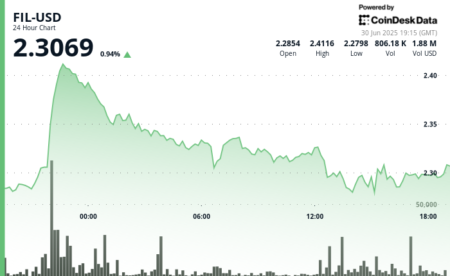Fold Holdings Delays Launch of Its Bitcoin Credit Card: What It Means for Investors and Users
Fold Holdings (FLD) made headlines recently when the company announced a delay in the rollout of its highly anticipated Fold Bitcoin Credit Card. This development came as a shock to investors and customers alike, leading to a rapid decline of over 7% in the company’s share price shortly after the news broke on Monday afternoon.
In a communication to its customers, Fold explained, “A key infrastructure partner unexpectedly exited the credit card business, disrupting our planned rollout. As a result, the launch of the Fold Bitcoin Credit Card is delayed as we transition to a new partner better aligned with our long-term roadmap.” Such unexpected hurdles in the tech and financial landscape are not uncommon, yet they can have significant implications for companies working at the intersection of cryptocurrency and consumer finance.
The Fold Bitcoin Credit Card was initially anticipated with great enthusiasm, especially considering the growing interest in cryptocurrency as a means of payment. With Bitcoin adoption on the rise, customers were eager to leverage the benefits of a card that allows them to earn Bitcoin on everyday purchases. However, the sudden disruption has left many wondering what the future holds for the product and the company.
Fold Holdings debuted on the public market in February at approximately $10 a share, but it faced immediate challenges, seeing its stock plummet to lows of $2.51 by mid-April. As of now, shares have rebounded slightly but are still hovering around $4.25. This fluctuation reflects investor sentiment surrounding the company’s stability, especially in light of this recent announcement. The delay could further impact investor confidence, necessitating clear communication from management on how they plan to navigate these challenges going forward.
For consumers, this delay raises questions not only about the functionality of the Fold card but also about how it will fit into the rapidly evolving landscape of digital finance. As more companies move towards integrating cryptocurrency into their products, customers are looking for reliable options. Fold’s decision to partner with a new infrastructure provider is commendable in terms of long-term strategy, but this transition may lead to further delays and uncertainty in the interim.
The cryptocurrency market is notoriously volatile, and companies operating in this space must be nimble to adapt to sudden changes. Stakeholders will be paying close attention to Fold’s subsequent announcements and strategic decisions over the coming weeks. Ultimately, this situation serves as a reminder of the challenges inherent in marrying traditional finance with innovative technology and how crucial it is for companies to ensure robust operational frameworks as they grow.
In conclusion, while the delay of the Fold Bitcoin Credit Card rollout presents immediate challenges, it also provides an opportunity for Fold Holdings to reassess its partnerships and strengthen its operational strategy. Investors and consumers alike will be watching closely to see how the company navigates this setback and what steps it takes to regain momentum in the market.

















